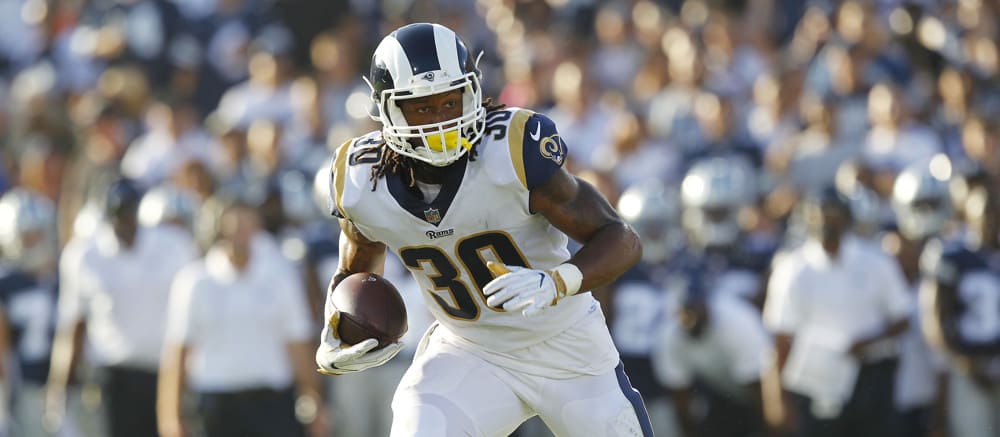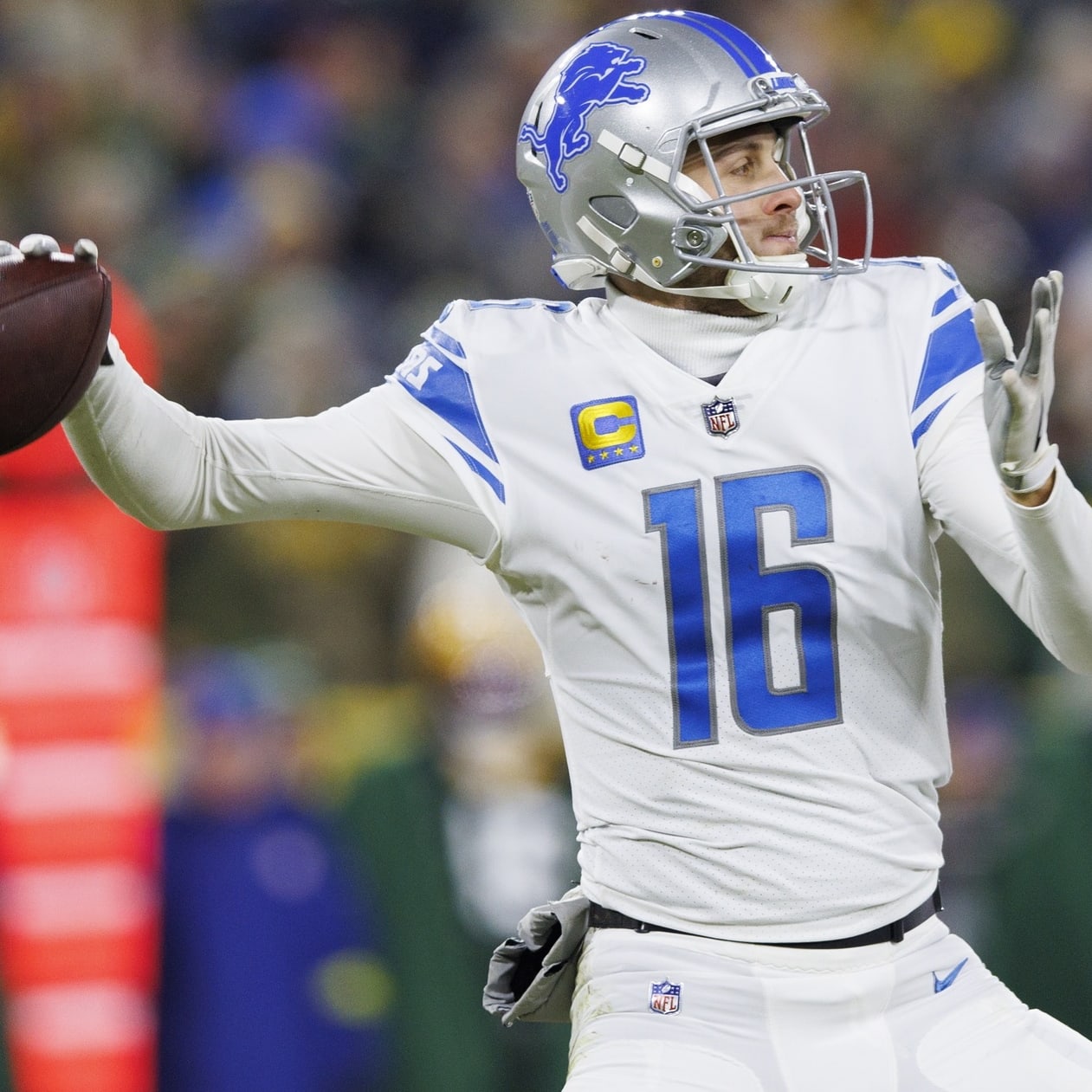This article is part of our Dynasty Strategy series.
With Todd Gurley and Melvin Gordon signed and delivered to their new teams, the Falcons and Broncos, it's worth examining more closely just what these two recent fantasy football juggernauts are looking at for their 2020 prospects. Are they toast, or is there hope yet for a renaissance for these two former stars?
Gurley signed a one-year, $5 million deal with Atlanta, returning to the state where he played college football. Likely assuming the role previously held by Devonta Freeman, Gurley's contract is noncommittal yet sufficient to project him well ahead of Ito Smith, Qadree Ollison, and Brian Hill. There are several questions obscuring the picture of Gurley's 2020 fantasy season all the same, including whether he has suffered physical decline and to what extent, whether his problematic knee is stable, and whether the Falcons intend to target another running back early in the draft. Since it's just a one-year deal for Gurley, the Falcons remain a good bet to select a formidable running back prospect in the second or third round. In the second round names like JK Dobbins and Cam Akers come to mind. In the third, the specter of A.J. Dillon could loom. Even by backup standards, the trio of Smith, Ollison, and Hill is underwhelming.
If the Falcons don't draft a running back early or Gurley otherwise holds off any rookie competition, then he could see a significant workload from scrimmage. The Falcons fed Freeman quite a bit last year even as Freeman struggled most of the way, logging 184 carries and 70 targets on 675 snaps in 14 games. Smith, Ollison, Hill, and Kenjon Barner otherwise combined for 126 carries and 38 targets on 277 snaps. For all the concern over Gurley's knee, he logged a substantial 807 snaps while carrying 223 times for 857 yards (3.8 YPC) and 12 touchdowns while catching 31 of 49 targets for 207 yards and two touchdowns (64.6 percent catch rate, 4.2 YPT).
If we imagine the Falcons running backs again combining for roughly 950 snaps in 2020, and if Gurley is able to log 700 of those snaps, then he would be in nice position to provide RB2 or even RB1 value in fantasy football. His 3.8 yards per carry rushing average last year implies skill decline, yet some of the peripheral numbers are encouraging. Gurley's broken tackle rate (14.3 percent) ranked 82nd percentile last year, while his percentage of yardage after contact (65.6) ranked 69th percentile. Given those facts, one can reasonably look at Gurley's positive run percentage of 79.4 percent (37th percentile) and conclude that Gurley's decline in rushing efficiency had more so due to decline in the Rams offensive line than with any detail on Gurley's part. If Gurley were totally washed up, wouldn't he be easier to tackle?
When you look at those same stats from 2019 in Freeman's case, there's a contrast to Gurley's numbers that imply Gurley would have been more successful in Freeman's position. The Atlanta run blocking was not good last year – Football Outsiders ranked it 24th in the league – so it's not shocking that Freeman's positive run percentage suffered, the 77.7 percent figure registering at the 27th percentile. But unlike Gurley, Freeman wasn't breaking tackles at a high rate (8.7 percent, 45th percentile) or generating yardage after contact (54.9 percent, 29th percentile). If Freeman had broken tackles at a 14.3 percent rate and generated 65.6 percent of his yardage after contact, then he might have gone over 4.0 yards per carry instead of plodding to a figure of 3.6 yards per carry. There's also reason to hope Gurley might bounce back as a pass catcher – Freeman drew 4.4 air yards per game (82nd percentile) and 10.6 percent of Atlanta's targets (81st percentile), which were better than Gurley's figures of 7.9 percent of team targets (67th percentile) and 2.3 air yards per game (67th percentile). It was only two years ago that Gurley averaged 7.2 yards per target, and the year before that he averaged 9.1 yards per target. Last year's poor results were likely the result of uncharacteristic drops (five on 49 targets) in a small sample.
The way it could go well for Gurley is pretty clear – he played relatively well last year and might do so again this year, especially if he can stay fully healthy and the Atlanta offensive line improves. The ways it could go poorly remain numerous, including a further deterioration of the knee, a decline in effectiveness due to wear and tear, a failure to improve on the part of the Atlanta offensive line, or even a rookie Day 2 running back earning a workload at Gurley's expense. There's a wide range of outcomes, but given the limited information we have in the meantime, we should probably assume Gurley is close to the top 15 at running back. If he can secure 13 carries and five targets per game, Gurley should hover no worse than around 1,400 yards from scrimmage over 16 games.
In Gordon's case we have a lot of similar concerns as in Gurley's. Gordon's knee health isn't regarded with as much concern as Gurley's reportedly arthritic joint, but it's easy to forget that Gordon had an early career microfracture surgery, and he played on a bad knee of some sort late in the 2018 season. Then there's the fact that Gordon, impressive as his past high points might have been, was never as good of a player as Gurley was in the first place. The question of where they rank in their respective declines is another issue, and there's a way for Gordon to come out ahead now even if he didn't in the past.
The main thing Gordon has going in his favor is the fact that the Broncos paid up to reel him in, which is in slight contrast to Gurley's one-year, $5 million deal. The Broncos coughed up $16 million over two years to secure Gordon, and these days that's big money for a running back. Generally speaking, you don't pay Gordon that much unless you plan to wear him out. Then again, with Phillip Lindsay already in town there may be reason to worry that this case is an exception. That's because regardless of whatever intentions the Broncos might have with regard to their workload split, we have extensive reason to believe Lindsay is the better pure runner between the two, meaning Gordon is the more likely of the two to find himself as the 'cold hand' in the carry rotation.
Gordon only exceeded 4.0 yards per carry in one of his five NFL seasons, and in that case the sample was still only 175 carries. He averaged 5.1 yards per carry that year (2018), while in the other four seasons he combined for 3,355 yards on 884 carries (3.8 YPC). Lindsay, meanwhile, has been a firecracker in the ground game since Day 1 for Denver, generating 2,048 yards and 16 touchdowns on 416 carries (4.9 YPC). Basically, we have reason to believe that for the Broncos to prefer Gordon as their true lead runner, they would need to resolve to accept lesser results than what Lindsay would likely provide. That's their prerogative, but it's perhaps a risky proposition to assume a team will voluntarily pursue a lesser outcome when the evidence is as strong as it is in this case.
For Gordon to decisively outrank Lindsay as Denver's lead running back, then he'll need to do substantial damage as a receiver. This is one area where Gordon has a clear advantage over Lindsay – Lindsay has been a rock in the ground game but a dud as a pass catcher, whereas Gordon has displayed a high volume of productive passing-down reps in the NFL. Lindsay drew 95 targets in his career, catching 70 (73.7 percent) but only at an anemic 4.6 yards per target. Gordon, on the other hand, drew 298 targets to this point and caught 224 of them (75.2 percent) at a much healthier 6.3 yards per target.
The NFL is a passing league at this point, so this one clear advantage of Gordon's is a crucial one. The question is whether Gordon's apparent superiority as a receiver is enough to reach the workhorse status his investors have in mind when they acquire him, or if Gordon will merely be just active enough to be a low-end RB2 type while banishing Lindsay to fantasy irrelevance. What will the Broncos have less patience for: Gordon's plodding running, or Lindsay's weak pass catching? That $8 million salary in Gordon's case might give the Broncos reason to grade him on a more generous curve.












